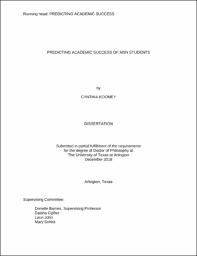
ATTENTION: The works hosted here are being migrated to a new repository that will consolidate resources, improve discoverability, and better show UTA's research impact on the global community. We will update authors as the migration progresses. Please see MavMatrix for more information.
Show simple item record
| dc.contributor.advisor | Barnes, Donelle M. | |
| dc.creator | Koomey, Cynthia L. | |
| dc.date.accessioned | 2019-02-26T20:47:59Z | |
| dc.date.available | 2019-02-26T20:47:59Z | |
| dc.date.created | 2018-12 | |
| dc.date.issued | 2018-12-05 | |
| dc.date.submitted | December 2018 | |
| dc.identifier.uri | http://hdl.handle.net/10106/27766 | |
| dc.description.abstract | Background: There is a great demand for nurses with advanced educational preparation in today’s healthcare environment (American Association of Colleges of Nursing [AACN], 2017a). Enrollment and retention of MSN students is critical in order to meet the increased demand.
Purpose: The purpose of this descriptive, correlational research design using secondary analysis was to examine six variables that may predict academic success in MSN students. The six variables were years since last formal educational degree, graduate nursing program site (online versus campus-based), academic pathway to graduate school (BSN versus RN-to-BSN), outside commitments (number of hours per week working in a paid job and number of children under 18 years of age living at home), and spouse/family members’ level of support for students’ educational endeavors.
Method: Surveys were emailed to former MSN students at a large, public university with 125 completed surveys included in the data analysis. Multiple logistic regression was used to predict graduation.
Findings: Of the 125 students, 75 (60%) had completed their MSN degree, and 50 (40%) had not completed and were marked as discontinued (inactive) students. The number of years since the students’ last degree was significantly associated with higher likelihood of graduation. There was no association between program site, academic pathway, number of hours worked per week, number of children, and spouse/family members’ level of support and graduation of MSN students.
Discussion: Future studies should include qualitative research to explore specific categories of stressors experienced by students during their MSN education, so that support programs in those areas can be developed to help facilitate academic success. Quantitative studies should include larger sample sizes and possibly examine students’ level of goal commitment as this could be an explanation for students with greater number of years since previous degree having increased academic success. | |
| dc.format.mimetype | application/pdf | |
| dc.language.iso | en_US | |
| dc.subject | Academic success | |
| dc.subject | MSN students | |
| dc.subject | Nursing education | |
| dc.title | Predicting Academic Success of MSN Students | |
| dc.title.alternative | Predicting Academic Success | |
| dc.type | Thesis | |
| dc.degree.department | Nursing | |
| dc.degree.name | Doctor of Philosophy in Nursing | |
| dc.date.updated | 2019-02-26T20:48:00Z | |
| thesis.degree.department | Nursing | |
| thesis.degree.grantor | The University of Texas at Arlington | |
| thesis.degree.level | Doctoral | |
| thesis.degree.name | Doctor of Philosophy in Nursing | |
| dc.type.material | text | |
| dc.creator.orcid | 0000-0003-4859-5229 | |
Files in this item
- Name:
- KOOMEY-DISSERTATION-2018.pdf
- Size:
- 1.048Mb
- Format:
- PDF
This item appears in the following Collection(s)
Show simple item record


